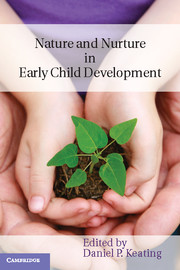Book contents
- Frontmatter
- Contents
- Contributors
- Acknowledgments
- Introduction
- 1 Biological and Experiential Influences on Psychological Development
- 2 Neural Development and Lifelong Plasticity
- 3 Mother and Child: Preparing for a Life
- 4 Early Experience and Stress Regulation in Human Development
- 5 Biology and Context: Symphonic Causation and the Distribution of Childhood Morbidities
- 6 Understanding Within-Family Variability in Children's Responses to Environmental Stress
- 7 Origins, Development, and Prevention of Aggressive Behavior
- 8 Mental Health Intervention in Infancy and Early Childhood
- 9 Bringing a Population Health Perspective to Early Biodevelopment: An Emerging Approach
- 10 Society and Early Child Development: Developmental Health Disparities in the Nature-and-Nurture Paradigm
- Index
- References
2 - Neural Development and Lifelong Plasticity
Published online by Cambridge University Press: 03 May 2011
- Frontmatter
- Contents
- Contributors
- Acknowledgments
- Introduction
- 1 Biological and Experiential Influences on Psychological Development
- 2 Neural Development and Lifelong Plasticity
- 3 Mother and Child: Preparing for a Life
- 4 Early Experience and Stress Regulation in Human Development
- 5 Biology and Context: Symphonic Causation and the Distribution of Childhood Morbidities
- 6 Understanding Within-Family Variability in Children's Responses to Environmental Stress
- 7 Origins, Development, and Prevention of Aggressive Behavior
- 8 Mental Health Intervention in Infancy and Early Childhood
- 9 Bringing a Population Health Perspective to Early Biodevelopment: An Emerging Approach
- 10 Society and Early Child Development: Developmental Health Disparities in the Nature-and-Nurture Paradigm
- Index
- References
Summary
The formation and growth of the human brain are undoubtedly two of the most remarkable feats of human construction. Although the 1990s were declared the “decade of the brain” in the United States, it is clear as we enter the early twenty-first century that our knowledge of brain function and development is far from complete. Knowledge of brain development is critical to understanding child development, a point made throughout this chapter. In particular, although it is commonly believed that brains develop on their own accord, largely under the direction of genes and hormones, I will make clear in this chapter that brains desperately need both endogenous and exogenous experiences to grow properly. In the sections that follow, I will describe the major events that give rise to the human brain. Once this blueprint is established, I will then discuss the role of experience in influencing the brain. I will do so by drawing on the role of both early and late experience to demonstrate that although brain development is largely limited to the first two decades of life, brain reorganization continues to occur through much of the life span.
BRAIN DEVELOPMENT – A PRÉCIS
Shortly after conception, rapid cell division in the zygote results in the formation of the blastocyst. By the end of the first week, the blastocyst itself has separated into an inner and outer layer.
- Type
- Chapter
- Information
- Nature and Nurture in Early Child Development , pp. 45 - 69Publisher: Cambridge University PressPrint publication year: 2010
References
- 2
- Cited by

